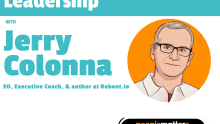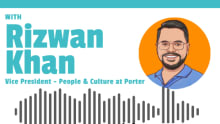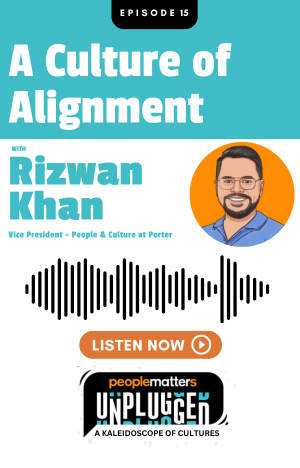The lens we view AI through today defines our relevance tomorrow

CEOs and other leaders consider themselves ready for AI; they predict a three-year time frame for pivoting their organisations' work to leverage the technology. HR, meanwhile, sees a five-year window; they are planning to get started within the next year or two.
These are the statistics that DN Prasad, President of the Singapore Human Resources Institute (SHRI) and senior director for people and organisation at GovTech Singapore, highlighted when People Matters asked him for his thoughts about the futureof HR in an AI-powered world.
“There is a huge number of people acknowledging the power of AI. But these people are also talking about a five-year horizon,” says Prasad, also known as DNP. That said, he believes the projected lead time is less important than the fact that people are aware of the possibilities at all.
“If someone is not ready to believe that AI will have a role to play, you won't even get them to take the first step of the journey. So for me, the fact that 70-80% of HR professionals even agree with the importance of adopting and implementing AI solutions is actually good news,” he says, citing studies by Business Standard and Gartner.
The conversation, held in the lead-up to the 19th World Human Resources Congress in Singapore, tackles questions that many people have been chewing over since ChatGPT hit the headlines more than a year ago. How ready are organisations for the latest technological shift? What kind of timeline should they be looking at? Where should they begin?
What's the first step on the AI journey?
The AI journey can be separated into three discrete segments. Speaking from his own background as an executive coach, DNP suggests that organisations need to focus on specific human aspects of each one:
The planning segment: when strategising, it is critical to communicate about AI often, clearly, and enough to reduce the fear and uncertainty associated with the technology. In particular, leaders need to assuage the perception that if AI becomes all-pervasive, people will lose their jobs.
The execution segment: a key part of execution is to deconstruct the jobs or roles that will be impacted by AI, whether positively or negatively. The way people work tomorrow will be different from how they work today, and roles have to be evaluated and reworked to acknowledge that. However, this is also where the greatest gap remains: most organisations simply have not reached this stage.
The scaling segment: in order to scale AI, organisations have to develop the workforce to be able to effectively leverage the technology. This feeds into the first two segments: workforce development is the best way to reduce fear and uncertainty, while job profile changes require a great deal of education, training, and practice on employees' part.
“You can't scale technology by itself: you have to prepare the people first. Technology can scale a lot of what we do, but you can't scale the execution of technology without people being ready for it,” DNP says of this last segment.
Will tech manage us, or will we manage tech?
The ideal outcome is for people to manage tech, rather than letting tech lead the way for the sake of having it. DNP suggests asking this question: “How are we using it?”
“We don't have to go in with a big bang. You can start small. To borrow a phrase that we use at GovTech: Think big, start small, act fast.”
His advice is to start by identifying several use cases that work the best, so as to build an internal level of confidence.
“With use cases, you can show people that AI can enhance your productivity without necessarily taking away your job. You can start training them, encouraging them to be early adopters and from there, even champions of the change. Keep the momentum going – one use case after another until people become accustomed to it and start actively looking at the next step. Maybe people on the onboarding team will see the success of their colleagues in talent acquisition and want to try it out for themselves.”
Most importantly, people need to recognise that AI is no longer an optional tool – it is a necessity.
“We can't just keep throwing bodies at the work anymore,” DNP says. “Today, we have reached a stage where any delay in adopting AI will be at our own peril. We are either in the game or we're sitting it out: it's as simple as that.”
Evolve our thinking and redesign our roles
“I used Microsoft Copilot in my preparation for this conversation,” DNP says. “But who is speaking here? It's certainly not Copilot. I'm equipping myself, learning more, structuring my thoughts, and creating my notes with AI, but at the end of the day, this conversation is not dictated by any script or structure originating from AI.”
That ability to draw a distinction between what AI can do for us and what we will actually let it take the lead in doing is critical, he believes, for people to set aside their fear of the technology.
“I would call it human-AI, or more broadly human-technology collaboration: co-existence within a team, within a function, or even within a role. Strategic partnership and decision making can be aided by people analytics, and aided further by Gen AI, but the decision is not something that the the technology can make for us. It is still a human decision.”
What that means is, we need to focus on teaching people how to make strategic and thoughtful decisions, whether through advising, mentoring, or coaching.
“I can set up an AI tool to listen to a coaching conversation and develop possible questions for the coach to ask. But if as a coach, all I do is take those AI-generated questions and repeat them, I'm not doing my job. I have to situate the AI's suggestions in the context of that conversation. That's what it means to evolve our thinking,” DNP says.
Redesigning roles, meanwhile, is not just a matter of debating existing roles. Instead, DNP feels we should look at the new roles and skill requirements emerging because of AI proliferation, and consider the opportunities inherent in those. AI ethics are one example that may emerge in the next four to five years, he thinks; change management specialising in AI may be another one.
And, of course, there is the opportunity to upskill HR professionals.
“Preserving the human touch is absolutely vital,” he says. “We can do it while embracing the transformative influence of AI, we can use it as a basis for HR upskilling. The human touch and the support of AI can go hand in hand to further the profession and scale the value-add that our professionals can provide to their business leaders.”
At the end of the day, HR must find ways to add value
“One of the biggest factors a HR professional should keep in mind is, am I adding value to my role? Is the role adding value to me as a professional? If either one of these is not happening, then it's time to start questioning ourselves. But if we can do this kind of questioning at individual levels, why are we not asking ourselves this question at a functional level or an organisational level?”
Gone are the days when HR can simply be considered an overhead and a cost function, DNP warns. “The guiding clarion call out there is: leaders and organisations need more and evolved value from the profession.”
He has a final tip for HR professionals pursuing that route: “I'm going to put on my coach's hat here. I think we need to do multiple levels of coaching here: organisational leaders, teams, and individuals. I'm a huge proponent of the power of leaders in setting the tone, and the role of middle managers in cascading that message.”
And as to the content of that message:
“To me, it's very clear that AI presents both opportunities and challenges. But what it will mean to the individual organisation, function, team or individual? All that depends on what lens we are using to look at it today. Whether we look at it as a challenge, opportunity, hardship, excitement, or something else, that lens will define the relevance of the profession and professionals. It's in our hands.”
Experience the forefront of HR innovation at WHRC 2024 in Singapore from 14th to 16th May 2024! Join HR professionals from around the globe for an enriching three-day journey of learning, networking, and collaborative exploration, all aimed at shaping the future of work.
Organised and hosted by the Singapore Human Resources Institute (SHRI) in partnership with the World Federation of People Management Associations (WFPMA). Click here to find out more.
People Matters is the exclusive HR media partner for WHRC 2024.












